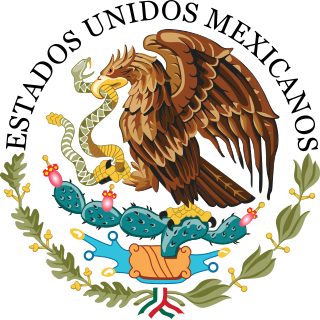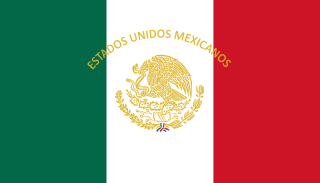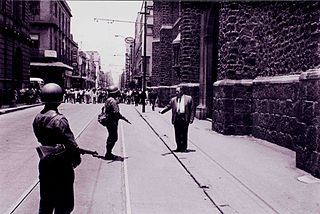
The politics of Mexico function within the framework of a federal presidential representative democratic republic whose government is based on a multi-party congressional system, where the President of Mexico is both head of state and head of government. The federal government represents the United Mexican States. It is divided into three branches: executive, legislative, and judicial, established by the Political Constitution of the United Mexican States, published in 1917. The constituent states of the federation must also have a republican government based on a congressional system established by their respective constitutions.

Carlos Salinas de Gortari is a Mexican economist and former politician who served as the 60th president of Mexico from 1988 to 1994. Affiliated with the Institutional Revolutionary Party (PRI), earlier in his career he worked in the Secretariat of Programming and Budget, eventually becoming Secretary. He secured the party's nomination for the 1988 general election and was elected amid widespread accusations of electoral fraud.

The Institutional Revolutionary Party is a political party in Mexico that was founded in 1929 as the National Revolutionary Party, then as the Party of the Mexican Revolution and finally as the PRI beginning in 1946. The party held uninterrupted power in the country and controlled the presidency twice: the first one was for 71 years, from 1929 to 2000, the second was for six years, from 2012 to 2018.

Cuauhtémoc Cárdenas Solórzano is a Mexican politician and civil engineer. A prominent social-democrat and the son of 51st president of Mexico Lázaro Cárdenas, he is a former Head of Government of Mexico City and a founder of the Party of the Democratic Revolution (PRD). He ran for the presidency of Mexico three times, and his loss in the 1988 Mexican general election to Institutional Revolutionary Party (PRI) candidate Carlos Salinas de Gortari had long been considered the result of electoral fraud perpetrated by the ruling PRI, later acknowledged by Miguel de la Madrid, the incumbent president at the time of the election. He previously served as a Senator, having been elected in 1976 to represent the state of Michoacán and also as the Governor of Michoacán from 1980 to 1986.

Ernesto Zedillo Ponce de León is a Mexican economist and politician. He was the 61st president of Mexico from 1994 to 2000, as the last of the uninterrupted 71-year line of Mexican presidents from the Institutional Revolutionary Party (PRI).

The Party of the Democratic Revolution is a state-level social democratic political party in Mexico. The PRD originated from the Democratic Current, a political faction formed in 1986 from the Institutional Revolutionary Party (PRI). The PRD was formed after the contested general election in 1988, which the PRD's immediate predecessor, the National Democratic Front, believed was rigged by the PRI. This sparked a movement away from the PRI's authoritarian rule.

The Ecologist Green Party of Mexico is a green political party in Mexico. Founded in 1986, the party is associated with Jorge González Torres and his son Jorge Emilio González Martínez. It has seldom gotten more than 10% of the vote nationwide, but in the 21st century has joined alliances with different major parties.

Roberto Madrazo Pintado is a Mexican politician and member of the Institutional Revolutionary Party. He was the candidate of the alliance between his party and the Ecologist Green Party of Mexico (PVEM) in the 2006 Mexican presidential election. He served as Governor of Tabasco from 1995 to 2000.

The Labor Party is a political party in Mexico. It was founded on 8 December 1990. The party is currently led by Alberto Anaya.
Víctor Manuel Camacho Solís was a Mexican politician who served in the cabinets of presidents Miguel de la Madrid and Carlos Salinas. Born in Mexico City to Manuel Camacho López and Luz Solís, he belonged to the Frente Amplio Progresista. At first he was affiliated with the PRI, later with the Party of the Democratic Center and then with the Party of the Democratic Revolution.

The Mexican Democratic Party was a Catholic social conservative political party in Mexico that existed between 1979 and 1997. At its height in 1982, the party had over 500,000 active voters and 12 seats in the Mexican Chamber of Deputies.

The Mexican Communist Party was a communist party in Mexico. It was founded in 1917 as the Socialist Workers' Party by Manabendra Nath Roy, a left-wing Indian revolutionary. The PSO changed its name to the Mexican Communist Party in November 1919. It was outlawed in 1925 by the government of Plutarco Elías Calles and remained illegal until 1935, during the presidency of the leftist Lázaro Cárdenas. The PCM saw the left wing of the nationalist regime that emerged from the Mexican Revolution—i.e. Cárdenas and his allies—as a progressive force to be supported. The PCM disappeared after helping form the Party of the Democratic Revolution, a split from the PRI led by the son of Lázaro Cárdenas, Cuauhtémoc Cárdenas.

The New Alliance Party is a state-level political party in Mexico founded in 2005.
La Onda was a multidisciplinary artistic movement created in Mexico by artists and intellectuals as part of the worldwide waves of the counterculture of the 1960s and the avant-garde. Pejoratively called as Literatura de la Onda by Margo Glantz in the beginning, the movement quickly grew and included other art forms with its followers called "onderos", "macizos" or "jipitecas". La Onda encompassed artistic productions in the worlds of cinema, literature, visual arts and music and strongly addressed social issues of the time such as women's rights, ecology, spirituality, artistic freedom, open drug use and democracy in a country tightly ruled by the PRI. According to Mexican intellectual Carlos Monsiváis, La Onda was "a new spirit, the repudiation of convention and prejudice, the creation of a new morality, the challenging of proper morals, the expansion of consciousness, the systematic revision and critique of the values offered by the West as sacred and perfect."

A number of elections, both federal and local, were scheduled to take place in Mexico during 2009.

The president of Mexico, officially the president of the United Mexican States, is the head of state and head of government of Mexico. Under the Constitution of Mexico, the president heads the executive branch of the federal government and is the commander in chief of the Mexican Armed Forces. The office, which was first established by the federal Constitution of 1824, is currently held by Claudia Sheinbaum, who was sworn-in on October 1, 2024. The office of the president is considered to be revolutionary, in the sense that the powers of office are derived from the Revolutionary Constitution of 1917. Another legacy of the Mexican Revolution is the Constitution's ban on re-election. Mexican presidents are limited to a single six-year term, called a sexenio. No one who has held the post, even on a caretaker basis, is allowed to run or serve again. The constitution and the office of the president closely follow the presidential system of government.

The Mexican Dirty War was the Mexican theater of the Cold War, an internal conflict from the 1960s to the 1980s between the Mexican Institutional Revolutionary Party (PRI)-ruled government under the presidencies of Gustavo Díaz Ordaz, Luis Echeverría, and José López Portillo, which were backed by the U.S. government, and left-wing student and guerrilla groups. During the war, government forces carried out disappearances, systematic torture, and "probable extrajudicial executions".

General elections were held in Mexico on 1 July 2018. Voters elected a new President of Mexico to serve a six-year term, 128 members of the Senate for a period of six years and 500 members of the Chamber of Deputies for a period of three years. It was one of the largest election days in Mexican history, with most of the nation's states holding state and local elections on the same day, including nine governorships, with over 3,400 positions subject to elections at all levels of government. It was the most violent campaign Mexico has experienced in recent history, with 130 political figures killed since September 2017.

Legislative elections were held in Mexico on 6 June 2021. Voters elected 500 deputies to sit in the Chamber of Deputies for the 65th Congress. These elections took place concurrently with the country's state elections.

















